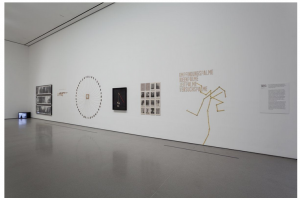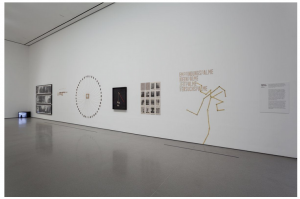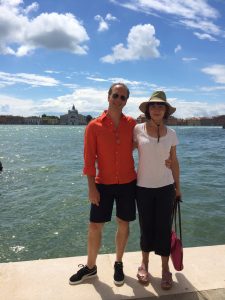Last year when we came to Italy, we went first to Venice and then to Florence and then to Rome.
We rented an apartment in Rome near the Vatican, and one evening went out for ice cream with our landlords. They had two bambini and we have one. In the course of the conversation, we discussed a large factory complex on an island outside of Venice that lies empty and unused. Marghera, I think it’s called.
“Some entrepreneur should come along and re-purpose the space,” I said. “Turn it into a nightclub or a mall or a skating rink.”
“That is not possible,” exclaimed our landlady, a lawyer, with total certainty.
“Sure it’s possible,” I shrugged. “Some bright person will come along and think of a way to re-use the space and make it productive. It doesn’t have to sit there and be empty. It could be an auction space, a market, or an art gallery. It could be anything.”
She insisted vigorously and with a rigid refusal to consider any other possibility that such a thing was not possible. The only possibility was that the factory would continue to lie fallow–forever.
She was a smart and educated woman, but I ended up looking at her and thinking that she was quite backwards. That’s my cultural bias, of course. In the US, some hotshot entrepreneur would come along and do something clever with the space and turn it into the next hot spot. If the first entrepreneur failed, the second would succeed. If the second didn’t, the fifth would.
The US–despite Obama’s best efforts to destroy the middle class and create a totalitarian state where every citizen’s most picayune communications are watched over by the NSA–is still all about reinvention. We still get second and third chances. Note to literary readers: we have long sense superseded Gatsby’s assumptions.
But in Italy, there is only one option: that the unused factory space, which was expensive to build, will remain empty and useless.
It’s an attitude that Sabin and I have encountered over and over again in our travels through Italy: “No can do.”
It’s not the fault of ordinary Italians. We meet people who work really hard. Over and over again, we hear the same thing: the bureaucracy in Italy is set up to thwart citizens, to deny fledging businesses any hope of success, and to create the conditions for business failure.
This year, our friend Paolo who owns rental apartments shared with us some of his woes. The government is constantly changing regulations, hoping to trip up rental businesses and thus fine them outrageously before shutting them down. This belligerence is in part sponsored by hotels, who don’t want tourists to have the option of renting apartments. But it is also the government trying to squeeze ever more taxes, fees, financial obligations, and huge fines out of a middle-class that is already wrung dry.
Other friends of ours here recounted how the government abruptly raised certain taxes from 20% to 22%, and consequently, over half of the small mom-and-pop shops went out of business. That 2% was everything for them. Businesses here have to pay for production, and they don’t get tax credits for it. Out of 1 euro, our friend said, he gets 40 euro cents, if he’s lucky. Sixty euro cents goes to the government, taxes, fees, tariffs, etc.
Plus, in Italy, the government can simply take funds out of a citizen’s bank account whenever it wants, like when it suddenly changes the rules on permits. A small business owner can go to the bank one morning and find there is substantially less than he or she expected–because of overnight changes.
Speaking of apartments, in Venice, there is a glut of unoccupied, closed up apartments. Families who have owned apartments forever have stopped offering vacation rentals because the government keeps changing the rules, and they don’t want to pay capricious and punitive fines. Owners are afraid to rent to students because they run the risk of the students destroying the property, and they’re even more afraid to rent to regular folks. If the renters stop paying, it’s almost impossible to evict them–especially if they have children.
So the smart thing to do is not to rent out apartments, but to board them up and let them be empty. And that is exactly what many Venetians do.
Our friends who run a small establishment won’t hire anyone to help them, because the laws governing labor are oppressively burdensome. So the husband and wife do everything themselves, and sometimes his mother pitches in.
Socialism destroys opportunities.
Then there is the corruption factor.
People still mention the Mafia. It’s a problem, more in the south than in the north, but people are aware that the Mafia influences the government and the passage of laws, that there is a criminal factor in the running of their country. In fact, in many places in the south, the Mafia is the government. What a shame.
One thing I always ask Italians, after everyone has had a little wine: “Perche Berlusconi?” I am thinking, How the hell could you have elected someone as mind-bogglingly corrupt, stupid, and bad for Italy as Berlusconi, and kept him in office for twenty years? If I am feeling particularly controversial, I mention the Bunga Bunga parties.
Over the last few years, many answers have erupted. Berlusconi owns much of the media is a favorite excuse. Someone from my Italian publisher told me that people voted for Berlusconi because they hoped that they, too, like him, would get away with corrupt behavior. “I am embarrassed about him,” one Italian woman, an educated professional, confessed the other day.
So here is a country with one of the great artistic, cultural, and historical patrimonies on Earth, and it is stuck in the mud and sinking. Italy is mired in failure, backward-thinking, socialism, and corruption. Che peccato.






